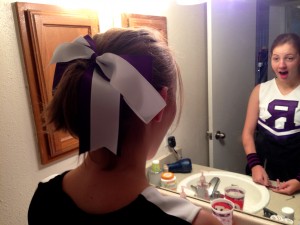At the Center of her Own Narrative
 Last week, Schuyler and I had the opportunity to speak to Dr. Samuel Sennott’s special education class at Portland State University. I knew it would be a positive experience going in; Sam’s a brilliant thinker, both as a special educator and a technology guru.
Last week, Schuyler and I had the opportunity to speak to Dr. Samuel Sennott’s special education class at Portland State University. I knew it would be a positive experience going in; Sam’s a brilliant thinker, both as a special educator and a technology guru.
But that wasn’t the primary reason I enjoyed the experience so much.
I had a feeling, given what I knew about Sam, that his students would be vibrant and engaged, and they were.
But that wasn’t it either.
I always enjoy talking to the young people who are going into the fields of special education or speech language pathology or AAC technology. Teachers are only as good as their approach, both to the material and to their students. A bad teacher can screw up a kid in ways that can be impossible to come back from; a good one can ignite something that propels that student forward at velocities that are unstoppable. The effect of a bad or a good special education teacher is even more acute, and their charges more vulnerable. Meeting college students who are eager to go into the fields where they can make so much of a difference reminds me that there are willing warriors in this world, and my respect for them is only matched by my gratitude.
But that’s been the case with every class to whom I’ve spoken. It certainly didn’t account for why this one in particular was special.
The students were well-prepared for the class, and they had assembled some of their questions ahead of time. Those questions were insightful and challenging, and they made me think. They asked my favorite kinds of questions: the ones that don’t have easy answers.
And here’s why I enjoyed this class so very, very much.
They didn’t ask most of their questions to me. Those questions were addressed to us both, or they were addressed to Schuyler.
Putting Schuyler at the center of her own story isn’t just polite. It’s appropriate, and it’s essential. She’s thirteen now, and while I’ve certainly spoken on her behalf, or at least facilitated her communication, when she was younger, she’s reaching an age where she will continue to advocate for herself more and more. I still speak for her far more often than I should, but sometimes I catch myself. Even as we endeavor to increase Schuyler’s communication skills, we’re working to provide her with the tools to express herself more comprehensively and training her to use those tools more efficiently and quickly. The goal is to enable her to hold her own, in any social or academic or even professional environment.
Sam’s students recognized that Schuyler is at the center of her own narrative, and they afforded her the respect that she has most certainly earned.
I can’t begin to tell you how happy that made me, or how much it bolstered my own sometimes uneven commitment to do the same.
Note: To support the site we make money on some products, product categories and services that we talk about on this website through affiliate relationships with the merchants in question. We get a small commission on sales of those products.That in no way affects our opinions of those products and services.

